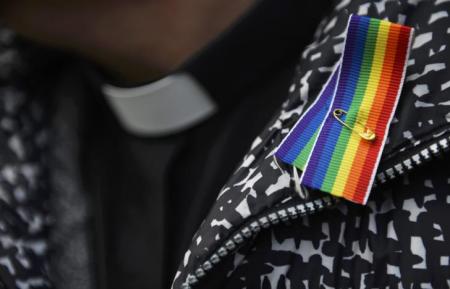Dozens of Church of England bishops want to allow clergy same-sex civil marriages

More than 40 Church of England bishops and senior church figures have expressed their desire to see an end to the denomination's ban on same-sex marriage among clergy.
Forty-four senior church figures, including 15 diocesan and 29 assistant or suffragan bishops, issued a statement this week calling for immediate guidance to allow LGBT clergy and ordinands to marry.
The bishops seek "a swift end to the current uncertainty" and advocate for the church to issue guidance that would remove restrictions on clergy from entering into same-sex civil marriages. They are also pushing for bishops to have the authority to ordain, license and grant permissions to officiate to clergy in same-sex marriages.
"We look forward to Guidance being issued without delay that includes the removal of all restrictions on clergy entering same-sex civil marriages, and on bishops ordaining and licensing such clergy, as well as granting permissions to officiate," the statement reads.
"We know that we will not all agree, but it is our longing that we will find a way that will recognize and honor our different perspectives and the gift we are to each other within the life of the Church of England, such that no one is expected to act against their
conscience or theological conviction."
The Anglican weekly newspaper The Church Times reports that while guidance exists in draft form, its publication has been stalled as it requires "further work."
The House of Bishops announced a plan to officially commend prayers for same-sex couples. This announcement was met with mixed reactions, as some bishops expressed concerns that the proposals did not adequately "safeguard the pastoral stability, mission, and unity of the church."
At least 11 members of the House of Bishops publicly dissented from the ecclesiastical body's decision to agree in principle on commending Prayers of Love and Faith for same-sex couples in a statement.
The controversial prayers ask for God's blessing for same-sex couples.
In the latest letter, the signatories voiced both support and desire for more action. They celebrate the agreement to commend the Prayers of Love and Faith but also express regret over the delay in authorizing separate service structures and sample services, committing to work towards that authorization.
The bishops' statement follows a motion passed by the General Synod, expressing remorse for the Church of England's past failures in welcoming LGBT individuals and its commitment to ongoing learning and to refining and issuing the Prayers of Love and Faith.
They emphasized the importance of "inclusivity" within the denomination, stating, "We long for the day when LGBTQIA+ people will know themselves to be unquestionably included in the life and all ministries of our Church, and the contributions of each one of us fully accepted and celebrated as simply the offering of a fellow Christian."
While acknowledging the differences within the church, the bishops expressed a hope to honor these different perspectives and the collective gift they represent, ensuring that no one is compelled to act against their conscience or theological conviction.
The bishops met in London last month to discuss next steps and also agreed that structures for special services for same-sex couples based on prayers should go forward to be formally authorized under canon law.
The proposals are to be considered at the next synod later this month, as is new pastoral guidance on how the system will operate.
Once approved, the proposals will pave the way for a process leading to the authorization of the services under Canon B2.
Dioceses will be consulted on this process before it is put to General Synod, most likely in 2025, with the plans requiring a two-thirds majority to pass.





















